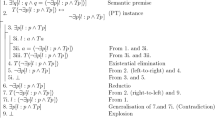Abstract
No semantic theory satisfying certain natural constraints can identify the semantic contents of sentences (the propositions they express), with sets of circumstances in which the sentences are true–no matter how fine-grained the circumstances are taken to be. An objection to the proof is shown to fail by virtue of conflating model-theoretic consequence between sentences with truth-conditional consequence between the semantic contents of sentences. The error underlines the impotence of distinguishing semantics, in the sense of a truth-based theory of logical consequence, and semantics, in the sense of a theory of meaning.
Similar content being viewed by others
Author information
Authors and Affiliations
Corresponding author
Rights and permissions
About this article
Cite this article
Soames, S. Why Propositions Cannot be Sets of Truth-supporting Circumstances. J Philos Logic 37, 267–276 (2008). https://doi.org/10.1007/s10992-007-9069-8
Published:
Issue Date:
DOI: https://doi.org/10.1007/s10992-007-9069-8




